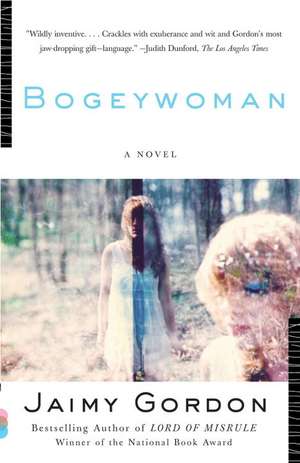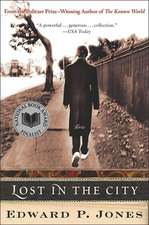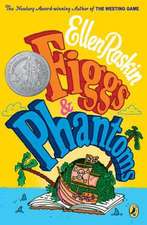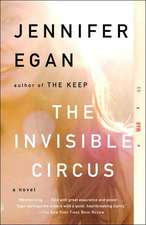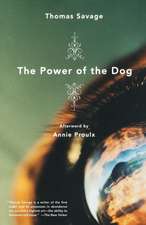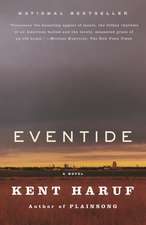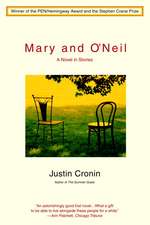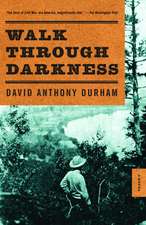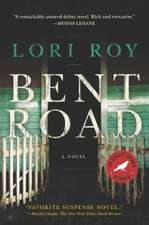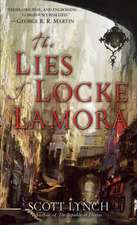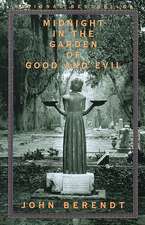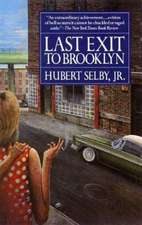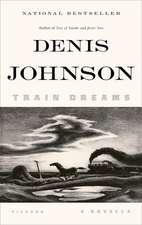Bogeywoman: Vintage Contemporaries
Autor Jaimy Gordonen Limba Engleză Paperback – 31 aug 2011
National Book Award Winner Jaimy Gordon’s bold and daring coming of age novel combines the teenaged angst of Catcher in the Rye with the humor and tragedy of Girl, Interrupted.
Ursie Koderer knows herself to be a monster--doomed to be different from other girls--very different. When she’s discovered cutting herself at camp, she goes AWOL, and lands in a Baltimore psychiatric hospital. Ursie, now known as the Bogeywoman, joins up with the other misfits on the adolescent ward. They start a bughouse rock group, steal a nitrous oxide machine. As a mental patient Ursie is a success. But then she’s implicated in the accidental burning of a friend. Locked away, the Bogeywoman meets the beautiful, mysterious Doctor Zuk, a woman psychiatrist from somewhere east of the Urals. Their affair is the main event in this gorgeous novel of love, crime, liberation, and flight to something like a new world.
Din seria Vintage Contemporaries
-
 Preț: 109.95 lei
Preț: 109.95 lei -
 Preț: 101.80 lei
Preț: 101.80 lei -
 Preț: 96.52 lei
Preț: 96.52 lei -
 Preț: 107.46 lei
Preț: 107.46 lei -
 Preț: 91.77 lei
Preț: 91.77 lei -
 Preț: 101.88 lei
Preț: 101.88 lei -
 Preț: 111.51 lei
Preț: 111.51 lei -
 Preț: 119.87 lei
Preț: 119.87 lei -
 Preț: 99.75 lei
Preț: 99.75 lei -
 Preț: 97.34 lei
Preț: 97.34 lei -
 Preț: 111.92 lei
Preț: 111.92 lei -
 Preț: 117.87 lei
Preț: 117.87 lei -
 Preț: 95.92 lei
Preț: 95.92 lei -
 Preț: 113.56 lei
Preț: 113.56 lei -
 Preț: 132.88 lei
Preț: 132.88 lei -
 Preț: 108.09 lei
Preț: 108.09 lei -
 Preț: 115.42 lei
Preț: 115.42 lei -
 Preț: 106.04 lei
Preț: 106.04 lei -
 Preț: 96.11 lei
Preț: 96.11 lei -
 Preț: 90.64 lei
Preț: 90.64 lei -
 Preț: 87.84 lei
Preț: 87.84 lei -
 Preț: 99.51 lei
Preț: 99.51 lei -
 Preț: 105.41 lei
Preț: 105.41 lei -
 Preț: 99.30 lei
Preț: 99.30 lei -
 Preț: 120.26 lei
Preț: 120.26 lei -
 Preț: 103.74 lei
Preț: 103.74 lei -
 Preț: 100.98 lei
Preț: 100.98 lei -
 Preț: 100.76 lei
Preț: 100.76 lei -
 Preț: 89.09 lei
Preț: 89.09 lei -
 Preț: 115.94 lei
Preț: 115.94 lei -
 Preț: 101.24 lei
Preț: 101.24 lei -
 Preț: 125.13 lei
Preț: 125.13 lei -
 Preț: 89.50 lei
Preț: 89.50 lei -
 Preț: 100.35 lei
Preț: 100.35 lei -
 Preț: 139.63 lei
Preț: 139.63 lei -
 Preț: 90.35 lei
Preț: 90.35 lei -
 Preț: 106.45 lei
Preț: 106.45 lei -
 Preț: 89.91 lei
Preț: 89.91 lei -
 Preț: 107.92 lei
Preț: 107.92 lei -
 Preț: 77.02 lei
Preț: 77.02 lei -
 Preț: 125.21 lei
Preț: 125.21 lei -
 Preț: 96.93 lei
Preț: 96.93 lei -
 Preț: 112.11 lei
Preț: 112.11 lei -
 Preț: 83.94 lei
Preț: 83.94 lei -
 Preț: 97.15 lei
Preț: 97.15 lei -
 Preț: 105.82 lei
Preț: 105.82 lei -
 Preț: 88.62 lei
Preț: 88.62 lei -
 Preț: 111.76 lei
Preț: 111.76 lei -
 Preț: 129.78 lei
Preț: 129.78 lei -
 Preț: 100.57 lei
Preț: 100.57 lei
Preț: 81.06 lei
Nou
Puncte Express: 122
Preț estimativ în valută:
15.51€ • 16.24$ • 12.83£
15.51€ • 16.24$ • 12.83£
Carte disponibilă
Livrare economică 15-29 martie
Preluare comenzi: 021 569.72.76
Specificații
ISBN-13: 9780307946898
ISBN-10: 0307946894
Pagini: 304
Dimensiuni: 134 x 203 x 17 mm
Greutate: 0.22 kg
Editura: Vintage Publishing
Seria Vintage Contemporaries
ISBN-10: 0307946894
Pagini: 304
Dimensiuni: 134 x 203 x 17 mm
Greutate: 0.22 kg
Editura: Vintage Publishing
Seria Vintage Contemporaries
Notă biografică
Jaimy Gordon’s Lord of Misrule won the National Book Award in 2010, and was also a finalist for the Pen/Faulkner Award. Bogeywoman, her third novel, was on the Los Angeles Times list of Best Books for 2000. Her second novel, She Drove Without Stopping, brought her an Academy Award for her fiction from the American Academy of Arts and Letters. She has been a fellow of the Fine Arts Work Center, Provincetown, and the Bunting (now Radcliffe) Institute at Harvard. She teaches at Western Michigan University in Kalamazoo and in the Prague Summer Program for Writers.
Extras
1
Tough Paradise for Girls
HOW LOVE GOT ME OUT OF THE BUGHOUSE
I’m the Bogeywoman. Maybe I belonged in the bughouse. Anyway it was Doctor Zuk who got me out, and then the fuddy dreambox mechanics kicked her out right behind me. But first she saved me, and that’s when I lost her— if I ever had her—unless I am her. Am I Zuk?
HOW LOVE GOT ME INTO THE BUGHOUSE
I mean how I ended up at the age of sixteen in the loonie bin, when I wasn’t even buggy.
It happened at Camp Chunkagunk, Tough Paradise for Girls. At camp I was always the Bogeywoman, but the true meaning of Bogeywoman only came to me in my sixteenth year, and that’s how I landed in the bughouse. It was a good camp that Merlin found for me and Margaret, a rare camp, a tough camp, but what normal girl goes to camp for nine summers? (Margaret had had it in four.) I was out beyond the White Caps’ rope, doing the dead man’s float, stringbean style. Dangling straight down, I mean. So I was staring not at the sky but at a certain girl also doing the dead man’s float— my Lake Twinny, Yvette Deaux was her name, one of those tall, broad-shouldered French girls from up around Sourhunk Lake, with a small head like an ostrich, handsome, strong, kinda dumb, I didn’t even like her much. I was seeing how her thighs were filaments of neon-green electricity under the lake, and all at once I got the idea I wanted to slide my hand between them. From that moment I saw everything in a different light, murky, as through a dark lake. From then on I was a ✽ Unbeknownst To Everybody, and that was the meaning of Bogeywoman.
At Camp Chunkagunk I had been the Bogeywoman ever since I dropped a black snake, during Quiet Hour, through the roof of the counselors’ cabin. I’m the Bogeywoman I rumbled in the chimney hole. I was just a Chipmunk then, age seven. And they had come rushing out into the dappled light, uttering pleased shrieks. See up there! on the roof! It’s that Ursie, Ursie Koderer. And I did not disappoint. I was their toy bad guy, their boygirl, their bogeygirl, no front teeth, smudge on the edge of every camp snapshot, always tearing around under a cracked, white-hot roof of blond hair. I was the Bogeywoman from that day on, even to the Big Bears.
(Big Bears wore their bathing suits strapless— their smooth-muscled shoulders gleamed, their slim rib cages held up their heads like bud vases over those shiny “latex” bathing suits we all wore, one-piece and boned like girdles, the opaline grosgrain plate of them cut mysteriously straight across the upper thigh, the knoll of coochie hidden under that ledge, in deep shadow.)
Then at sixteen I found out my love of Camp Chunkagunk was a hunger. And always had been, I guess, only in the beginning I ate like a bird. Now I saw the same things I had always seen, but I was afraid to leave them alone with me.
(They already had some fluting there, the Big Bears, at the clavicle— and that sunny prickle, a rash like eensy roses climbing up the throat, and half of them had a pigtail, soaked black by lake water, wrapped around it, and drops of water rolling drunkenly into the baby-oiled gulley between their momps under the latex, the iridescent breastplate slipping down just slightly.)
I was a Big Bear now myself. I was an older girl and a ✽ so I did not. Was mad to but would not. Lemme die first. Yvette Deaux never even knew. I have always been the boss of my hunger, the chef of my starvation, so to speak. I can read the sign. Does it say do not touch? I don’t touch. I have never (except that once) driven away a scared girl with a stray hand across the border. She’s gotta put a hand on me first.
And she does. That’s why my luck is good. That’s why I’ve had nothing, well, almost nothing, to do with craggy-jawed bus station hags, broken-toothed gym teachers with whistles around their necks, or crewcut WACs. I prefer ladies— like Margaret, my first love. Margaret loved me. Margaret, you might say, trained me to be loved. But I am seldom as shocked by the sheer piggery behind fine fingers and fluted hipbones as anybody would be with old Margaret. Ladies are prone to first touches and second thoughts. I am not a lesbo, they announce, and I say, a ✽?! Whaddaya mean? Me neither— I, er, just kinda like you.
Yes, it’s a tracker’s nightmare, girlgoyle sex, and naturally the great wood wizardess, Willis Marie Bundgus, forgot to leave me a map. A girl floods, to her own surprise, in some forbidden place (like my mouth) and ducks underground. A lizardly muscle, a girl’s love, strong but small. Small but strong. How to get her back? I try to know where she is even when she isn’t here, isn’t mine, that’s wood wiz, but I never was the wood wizardess. Still, there must be sumpm about me, at least at first. At first I had sumpm— even if it put me in the bughouse— with Lou Rae Greenrule.
So. That last summer at camp. The girlgoyle in question. To start with, her hair. Her hair was the kind that requires an engineer of a mother in the wings, or so I had always thought. At P.S.149, a few girls came to school day after day with heads piled in ringlets sky-high— jiggling towers of them that ambitious moms had whipped up. This mother had taste Merlin regarded as sugary, it is true. We, motherless, were raised to despise that, and so were only distantly covetous— compared to girls in boiled-icing ringlets, Margaret and me were of some third sex and we knew it. Us Merlin’s Suzette swept off to the barbershop once a season, got rid of the stuff. But Lou Rae Greenrule had hair a hundred times more done than any of those girls, and yet her mother was a cockroach of a person in a hard-shell permanent wave and slacks, no ass and a sad little potbelly in front, one shoulder permanently lower than the other from going everywhere she went with her right hand hooked in a six-pack.
Besides the hair she did herself, Lou Rae had amazing breasts for such a small girl, not only real but hard as babies’ heads. You’ll want to know how I found that out. I’m getting to that— how I found out.
Camp Chunkagunk, Tough Paradise for Girls, had no cabins but double rows of army tents set on high wooden platforms weathered to pearl. Their green tent flaps swung wide of them like wings. You could sit on the spars and yardarms with a sense of nothing under you. Even your swinging feet were too high to kick weeds. Lou Rae dangled here that day on the Big Bear tentline with a stack of flat green leaves like pancakes on her head and a masque of gray mud on her cheeks.
“For the complexion,” she explained, as if there was just one complexion for everybody. “All the Indian maids wore chunkagunk— for the complexion.” “The lost chunkagunk was a food, not a mud,” I objected. “So what?” Lou Rae smiled, “some people eat dirt and anyhow you wash your hair with egg and honey don’t ya? My aunt Lola uses puréed artichokes on her bosom. La beauté’s gotta eat too.” I didn’t answer since I washed my hair with nothing, just steeped it in lake water twice a day. Even now it smelled like a swamp and was a swamp, or anyway the weight of it lay like a wet plaster on the back of my neck.
Lou Rae was holding a mud-smeared bandaid box. I could see where she had dug the dirt out of the packed ground between the tents with a pencil. She was a small, serious person with wine-dark hair and wide lips that looked pale pink next to the dark gray mud.
“But who’s gonna see you?” I asked. I meant we’re at girls’ camp, NO BOYS ALLOWED, for godzillas sake. “Who is seeing me?” said Lou Rae, tipping up one surprisingly thatchy eyebrow. Then my scalp shrank under its wet fur and my ears boiled because she was right. I was a ✽ Unbeknownst To Everybody. Probably she’d seen herself in the big round pies of my eyes. I was plop in love with her. She had those green leaves scalloping her brow and looked faintly blurry, like an elf maid enlarged by a microscope.
Lou Rae’s mother always brought her and her trunk to camp a couple days late in a Veteran’s Cab all the way from Bangor. Lou Rae went to some second-rate boarding school in Freeport where everyone smoked cigarettes, starting in fourth grade. There was a story around that her father, a Bangor florist, was in jail for burning down his greenhouse, and for taxes. So probably Lou Rae’s brain like mine was some kinda swiss cheese from bugs of worry crawling in and out. But she wasn’t a famously bad girl like me. I mean at Chunkagunk I had my own spot: I was the Bogeywoman, sort of like Frankenstein, but tamed by kind treatment. Unlike Lou Rae I was no beauty at sixteen. I still had those eaves of blond hair, those white-hot roof sheets, but now they hung down in rusty flaps. In my last Upside Down Day camp picture, my smile was only half a smile, because it swung left. I had grated
my voice down and pushed it out the side of my mouth, and my big tough talk had left the bag a little torn, which it still is. My nose bulb had bumps like a potato, and a black dot from some KP ketchup fight made a bull’s-eye out of my Adam’s apple.
Yes, it was a good camp that Merlin and Suzette had the sense to send us to. There were no baths so you went in that arctic lake every morning at nine, long before the sun had fought its way through the porridge of clouds. Chunkagunk was cheap and tough, which took care of all the girls you really couldn’t have stomached, and disguised the rest in their beautiful new toughness (except for Lou Rae Greenrule, who had her own kind of toughness). Anyway the girls who went there were Maine girls, innocent and strong, who had no idea that camp was corny. Nothing like the girls at home, club-formers and plotters from the earliest age. Margaret and me were not so clean, both of us being the type who joined girls’ clubs but got kicked out of them. So we were happy among the innocents, at least at first. We were the only Jews: which was nothing new from Merlin and his Suzette. When I think of all the places where we were the only Jews!— Meadowbottom Pool and that Brownie camp on the Magothy where the tidewater river was so thick with sea nettles it looked like egg drop soup, the Ploy Street Children’s Theater, the Cockeysville Equestrian Academy . . .
I loved Camp Chunkagunk, although I knew that camp was corn. But now I was a ✽ Unbeknownst To Everybody. My love had a face with sumpm smeared on it. Camp was full of girls. I was the Bogeywoman. How could I just go on braiding gimp lanyards for the girl of my choice?
But Lou Rae loved camp too, for all its corn. If Maine girls were corny without knowing it, Lou Rae Greenrule was exempt from corn, in its midst. In her cheerful serious way, with her nuggety black, unblinking, rather unhuman stare, she dared old Mrs. Doggett to throw her out of camp for not showing up at Lake Sci and Wood Wiz and Evening Pro. Even plunked on a rock in a campfire ring, even in Chunkagunk middy and baggy shorts, Lou Rae was on a whole nuther planet from corn, and she liked it there.
They tented us together, in the last tent of the tentline. Maybe they hoped the Bogeywoman’s fanatical love of camp would suck Lou Rae along behind it, and at first I tried. “Hey, you wouldn’t mooch Evening Pro when Old Doggett is in the middle of the Chunkagunk legend, would ya?”
“Well I already missed part one,” Lou Rae yawned.
“Never mind, I got part one by heart,” said I, “here’s how it goes. The wily rabbit Ableemooch has always been the wily giant Gooskuk’s wood wizard, but far from getting his hoped-for reward of a hundred wampum’s worth of beans and carrots for guiding Gooskuk through the forest, he gets shaken down day after day for his lunch. Every day around noon Gooskuk roars ‘How about some lunch’ and when Ableemooch pipes ‘Me too’ and takes out his little brown bag of sassafras bark, Gooskuk swipes it and gulps it down, and when he’s done he belches gutabervenig, which in Chunkagunk means pretty good. So Ableemooch, thoroughly fed up with this unequal division of mooching, goes to see wily Grandmother Bearsquaw, who agrees to help.
“Grandmother Bearsquaw goes into her cave for a while and knocks around and strains and groans and says hocus pocus in Chunkagunk and comes out again with a ball of sumpm truly disgusting. ‘Ugh, what is it?’ Ableemooch asks. ‘Never mind,’ says Grandmother Bearsquaw, ‘ just take it and tomorrow night bring me back what’s left and tell me all that’s happened.’ ‘What do I owe you?’ ‘Nuttin,’ says Grandmother Bearsquaw, ‘there’s plenty more where that came from.’ Ableemooch wonders about that. Maybe it’s a trick, he thinks, usually Grandmother Bearsquaw wants a hundred wampums’ worth of fish or berries or sumpm. Even Gooskuk’ll never eat sumpm so disgusting, and then I’ll probably have to eat it myself, Ableemooch mutters, but he takes it anyway.
“So next day when Gooskuk yells, ‘How about some lunch,’ Ableemooch pulls the small ball of sumpm disgusting out of his pocket . . . And that’s where Doggett left off. To hear part two, you gotta come to Evening Pro.”
Lou Rae smiled her mysterious smile at me in which her wide lips curved up stealthily at their ends like a canoe and no teeth showed. She sat Indian fashion on her cot, with green Old Maid cards spread all around her like lily pads. “Unh-unh,” she said. “Why not?” “I like having nothing to do.” “Godzillas sake, don’t you want to find out what happens?” “I like it better when you tell me,” Lou Rae said, “after taps. In bed. In the dark.” “What the hump it isn’t even scary,” I said. Lou Rae turned over an Old Maid without saying anything. “What kinda nothing do you do?” I asked. “I count stars.”
Tough Paradise for Girls
HOW LOVE GOT ME OUT OF THE BUGHOUSE
I’m the Bogeywoman. Maybe I belonged in the bughouse. Anyway it was Doctor Zuk who got me out, and then the fuddy dreambox mechanics kicked her out right behind me. But first she saved me, and that’s when I lost her— if I ever had her—unless I am her. Am I Zuk?
HOW LOVE GOT ME INTO THE BUGHOUSE
I mean how I ended up at the age of sixteen in the loonie bin, when I wasn’t even buggy.
It happened at Camp Chunkagunk, Tough Paradise for Girls. At camp I was always the Bogeywoman, but the true meaning of Bogeywoman only came to me in my sixteenth year, and that’s how I landed in the bughouse. It was a good camp that Merlin found for me and Margaret, a rare camp, a tough camp, but what normal girl goes to camp for nine summers? (Margaret had had it in four.) I was out beyond the White Caps’ rope, doing the dead man’s float, stringbean style. Dangling straight down, I mean. So I was staring not at the sky but at a certain girl also doing the dead man’s float— my Lake Twinny, Yvette Deaux was her name, one of those tall, broad-shouldered French girls from up around Sourhunk Lake, with a small head like an ostrich, handsome, strong, kinda dumb, I didn’t even like her much. I was seeing how her thighs were filaments of neon-green electricity under the lake, and all at once I got the idea I wanted to slide my hand between them. From that moment I saw everything in a different light, murky, as through a dark lake. From then on I was a ✽ Unbeknownst To Everybody, and that was the meaning of Bogeywoman.
At Camp Chunkagunk I had been the Bogeywoman ever since I dropped a black snake, during Quiet Hour, through the roof of the counselors’ cabin. I’m the Bogeywoman I rumbled in the chimney hole. I was just a Chipmunk then, age seven. And they had come rushing out into the dappled light, uttering pleased shrieks. See up there! on the roof! It’s that Ursie, Ursie Koderer. And I did not disappoint. I was their toy bad guy, their boygirl, their bogeygirl, no front teeth, smudge on the edge of every camp snapshot, always tearing around under a cracked, white-hot roof of blond hair. I was the Bogeywoman from that day on, even to the Big Bears.
(Big Bears wore their bathing suits strapless— their smooth-muscled shoulders gleamed, their slim rib cages held up their heads like bud vases over those shiny “latex” bathing suits we all wore, one-piece and boned like girdles, the opaline grosgrain plate of them cut mysteriously straight across the upper thigh, the knoll of coochie hidden under that ledge, in deep shadow.)
Then at sixteen I found out my love of Camp Chunkagunk was a hunger. And always had been, I guess, only in the beginning I ate like a bird. Now I saw the same things I had always seen, but I was afraid to leave them alone with me.
(They already had some fluting there, the Big Bears, at the clavicle— and that sunny prickle, a rash like eensy roses climbing up the throat, and half of them had a pigtail, soaked black by lake water, wrapped around it, and drops of water rolling drunkenly into the baby-oiled gulley between their momps under the latex, the iridescent breastplate slipping down just slightly.)
I was a Big Bear now myself. I was an older girl and a ✽ so I did not. Was mad to but would not. Lemme die first. Yvette Deaux never even knew. I have always been the boss of my hunger, the chef of my starvation, so to speak. I can read the sign. Does it say do not touch? I don’t touch. I have never (except that once) driven away a scared girl with a stray hand across the border. She’s gotta put a hand on me first.
And she does. That’s why my luck is good. That’s why I’ve had nothing, well, almost nothing, to do with craggy-jawed bus station hags, broken-toothed gym teachers with whistles around their necks, or crewcut WACs. I prefer ladies— like Margaret, my first love. Margaret loved me. Margaret, you might say, trained me to be loved. But I am seldom as shocked by the sheer piggery behind fine fingers and fluted hipbones as anybody would be with old Margaret. Ladies are prone to first touches and second thoughts. I am not a lesbo, they announce, and I say, a ✽?! Whaddaya mean? Me neither— I, er, just kinda like you.
Yes, it’s a tracker’s nightmare, girlgoyle sex, and naturally the great wood wizardess, Willis Marie Bundgus, forgot to leave me a map. A girl floods, to her own surprise, in some forbidden place (like my mouth) and ducks underground. A lizardly muscle, a girl’s love, strong but small. Small but strong. How to get her back? I try to know where she is even when she isn’t here, isn’t mine, that’s wood wiz, but I never was the wood wizardess. Still, there must be sumpm about me, at least at first. At first I had sumpm— even if it put me in the bughouse— with Lou Rae Greenrule.
So. That last summer at camp. The girlgoyle in question. To start with, her hair. Her hair was the kind that requires an engineer of a mother in the wings, or so I had always thought. At P.S.149, a few girls came to school day after day with heads piled in ringlets sky-high— jiggling towers of them that ambitious moms had whipped up. This mother had taste Merlin regarded as sugary, it is true. We, motherless, were raised to despise that, and so were only distantly covetous— compared to girls in boiled-icing ringlets, Margaret and me were of some third sex and we knew it. Us Merlin’s Suzette swept off to the barbershop once a season, got rid of the stuff. But Lou Rae Greenrule had hair a hundred times more done than any of those girls, and yet her mother was a cockroach of a person in a hard-shell permanent wave and slacks, no ass and a sad little potbelly in front, one shoulder permanently lower than the other from going everywhere she went with her right hand hooked in a six-pack.
Besides the hair she did herself, Lou Rae had amazing breasts for such a small girl, not only real but hard as babies’ heads. You’ll want to know how I found that out. I’m getting to that— how I found out.
Camp Chunkagunk, Tough Paradise for Girls, had no cabins but double rows of army tents set on high wooden platforms weathered to pearl. Their green tent flaps swung wide of them like wings. You could sit on the spars and yardarms with a sense of nothing under you. Even your swinging feet were too high to kick weeds. Lou Rae dangled here that day on the Big Bear tentline with a stack of flat green leaves like pancakes on her head and a masque of gray mud on her cheeks.
“For the complexion,” she explained, as if there was just one complexion for everybody. “All the Indian maids wore chunkagunk— for the complexion.” “The lost chunkagunk was a food, not a mud,” I objected. “So what?” Lou Rae smiled, “some people eat dirt and anyhow you wash your hair with egg and honey don’t ya? My aunt Lola uses puréed artichokes on her bosom. La beauté’s gotta eat too.” I didn’t answer since I washed my hair with nothing, just steeped it in lake water twice a day. Even now it smelled like a swamp and was a swamp, or anyway the weight of it lay like a wet plaster on the back of my neck.
Lou Rae was holding a mud-smeared bandaid box. I could see where she had dug the dirt out of the packed ground between the tents with a pencil. She was a small, serious person with wine-dark hair and wide lips that looked pale pink next to the dark gray mud.
“But who’s gonna see you?” I asked. I meant we’re at girls’ camp, NO BOYS ALLOWED, for godzillas sake. “Who is seeing me?” said Lou Rae, tipping up one surprisingly thatchy eyebrow. Then my scalp shrank under its wet fur and my ears boiled because she was right. I was a ✽ Unbeknownst To Everybody. Probably she’d seen herself in the big round pies of my eyes. I was plop in love with her. She had those green leaves scalloping her brow and looked faintly blurry, like an elf maid enlarged by a microscope.
Lou Rae’s mother always brought her and her trunk to camp a couple days late in a Veteran’s Cab all the way from Bangor. Lou Rae went to some second-rate boarding school in Freeport where everyone smoked cigarettes, starting in fourth grade. There was a story around that her father, a Bangor florist, was in jail for burning down his greenhouse, and for taxes. So probably Lou Rae’s brain like mine was some kinda swiss cheese from bugs of worry crawling in and out. But she wasn’t a famously bad girl like me. I mean at Chunkagunk I had my own spot: I was the Bogeywoman, sort of like Frankenstein, but tamed by kind treatment. Unlike Lou Rae I was no beauty at sixteen. I still had those eaves of blond hair, those white-hot roof sheets, but now they hung down in rusty flaps. In my last Upside Down Day camp picture, my smile was only half a smile, because it swung left. I had grated
my voice down and pushed it out the side of my mouth, and my big tough talk had left the bag a little torn, which it still is. My nose bulb had bumps like a potato, and a black dot from some KP ketchup fight made a bull’s-eye out of my Adam’s apple.
Yes, it was a good camp that Merlin and Suzette had the sense to send us to. There were no baths so you went in that arctic lake every morning at nine, long before the sun had fought its way through the porridge of clouds. Chunkagunk was cheap and tough, which took care of all the girls you really couldn’t have stomached, and disguised the rest in their beautiful new toughness (except for Lou Rae Greenrule, who had her own kind of toughness). Anyway the girls who went there were Maine girls, innocent and strong, who had no idea that camp was corny. Nothing like the girls at home, club-formers and plotters from the earliest age. Margaret and me were not so clean, both of us being the type who joined girls’ clubs but got kicked out of them. So we were happy among the innocents, at least at first. We were the only Jews: which was nothing new from Merlin and his Suzette. When I think of all the places where we were the only Jews!— Meadowbottom Pool and that Brownie camp on the Magothy where the tidewater river was so thick with sea nettles it looked like egg drop soup, the Ploy Street Children’s Theater, the Cockeysville Equestrian Academy . . .
I loved Camp Chunkagunk, although I knew that camp was corn. But now I was a ✽ Unbeknownst To Everybody. My love had a face with sumpm smeared on it. Camp was full of girls. I was the Bogeywoman. How could I just go on braiding gimp lanyards for the girl of my choice?
But Lou Rae loved camp too, for all its corn. If Maine girls were corny without knowing it, Lou Rae Greenrule was exempt from corn, in its midst. In her cheerful serious way, with her nuggety black, unblinking, rather unhuman stare, she dared old Mrs. Doggett to throw her out of camp for not showing up at Lake Sci and Wood Wiz and Evening Pro. Even plunked on a rock in a campfire ring, even in Chunkagunk middy and baggy shorts, Lou Rae was on a whole nuther planet from corn, and she liked it there.
They tented us together, in the last tent of the tentline. Maybe they hoped the Bogeywoman’s fanatical love of camp would suck Lou Rae along behind it, and at first I tried. “Hey, you wouldn’t mooch Evening Pro when Old Doggett is in the middle of the Chunkagunk legend, would ya?”
“Well I already missed part one,” Lou Rae yawned.
“Never mind, I got part one by heart,” said I, “here’s how it goes. The wily rabbit Ableemooch has always been the wily giant Gooskuk’s wood wizard, but far from getting his hoped-for reward of a hundred wampum’s worth of beans and carrots for guiding Gooskuk through the forest, he gets shaken down day after day for his lunch. Every day around noon Gooskuk roars ‘How about some lunch’ and when Ableemooch pipes ‘Me too’ and takes out his little brown bag of sassafras bark, Gooskuk swipes it and gulps it down, and when he’s done he belches gutabervenig, which in Chunkagunk means pretty good. So Ableemooch, thoroughly fed up with this unequal division of mooching, goes to see wily Grandmother Bearsquaw, who agrees to help.
“Grandmother Bearsquaw goes into her cave for a while and knocks around and strains and groans and says hocus pocus in Chunkagunk and comes out again with a ball of sumpm truly disgusting. ‘Ugh, what is it?’ Ableemooch asks. ‘Never mind,’ says Grandmother Bearsquaw, ‘ just take it and tomorrow night bring me back what’s left and tell me all that’s happened.’ ‘What do I owe you?’ ‘Nuttin,’ says Grandmother Bearsquaw, ‘there’s plenty more where that came from.’ Ableemooch wonders about that. Maybe it’s a trick, he thinks, usually Grandmother Bearsquaw wants a hundred wampums’ worth of fish or berries or sumpm. Even Gooskuk’ll never eat sumpm so disgusting, and then I’ll probably have to eat it myself, Ableemooch mutters, but he takes it anyway.
“So next day when Gooskuk yells, ‘How about some lunch,’ Ableemooch pulls the small ball of sumpm disgusting out of his pocket . . . And that’s where Doggett left off. To hear part two, you gotta come to Evening Pro.”
Lou Rae smiled her mysterious smile at me in which her wide lips curved up stealthily at their ends like a canoe and no teeth showed. She sat Indian fashion on her cot, with green Old Maid cards spread all around her like lily pads. “Unh-unh,” she said. “Why not?” “I like having nothing to do.” “Godzillas sake, don’t you want to find out what happens?” “I like it better when you tell me,” Lou Rae said, “after taps. In bed. In the dark.” “What the hump it isn’t even scary,” I said. Lou Rae turned over an Old Maid without saying anything. “What kinda nothing do you do?” I asked. “I count stars.”
Recenzii
"Wildly inventive. . . . Crackles with exuberance and wit and Gordon's most jaw-dropping gift--language."-- Judith Dunford, The Los Angeles Times
“Words sizzle and crackle and burst into life on the page. Once again, Jaimy Gordon dazzles." —Joanna Scott, author of Follow Me
"Jaimy Gordon is an extraordinary writer."--Review of Contemporary Fiction
“Funny, heartbreaking, perfectly described.” —Elizabeth McCracken, author of The Giant's House
“Words sizzle and crackle and burst into life on the page. Once again, Jaimy Gordon dazzles." —Joanna Scott, author of Follow Me
"Jaimy Gordon is an extraordinary writer."--Review of Contemporary Fiction
“Funny, heartbreaking, perfectly described.” —Elizabeth McCracken, author of The Giant's House
